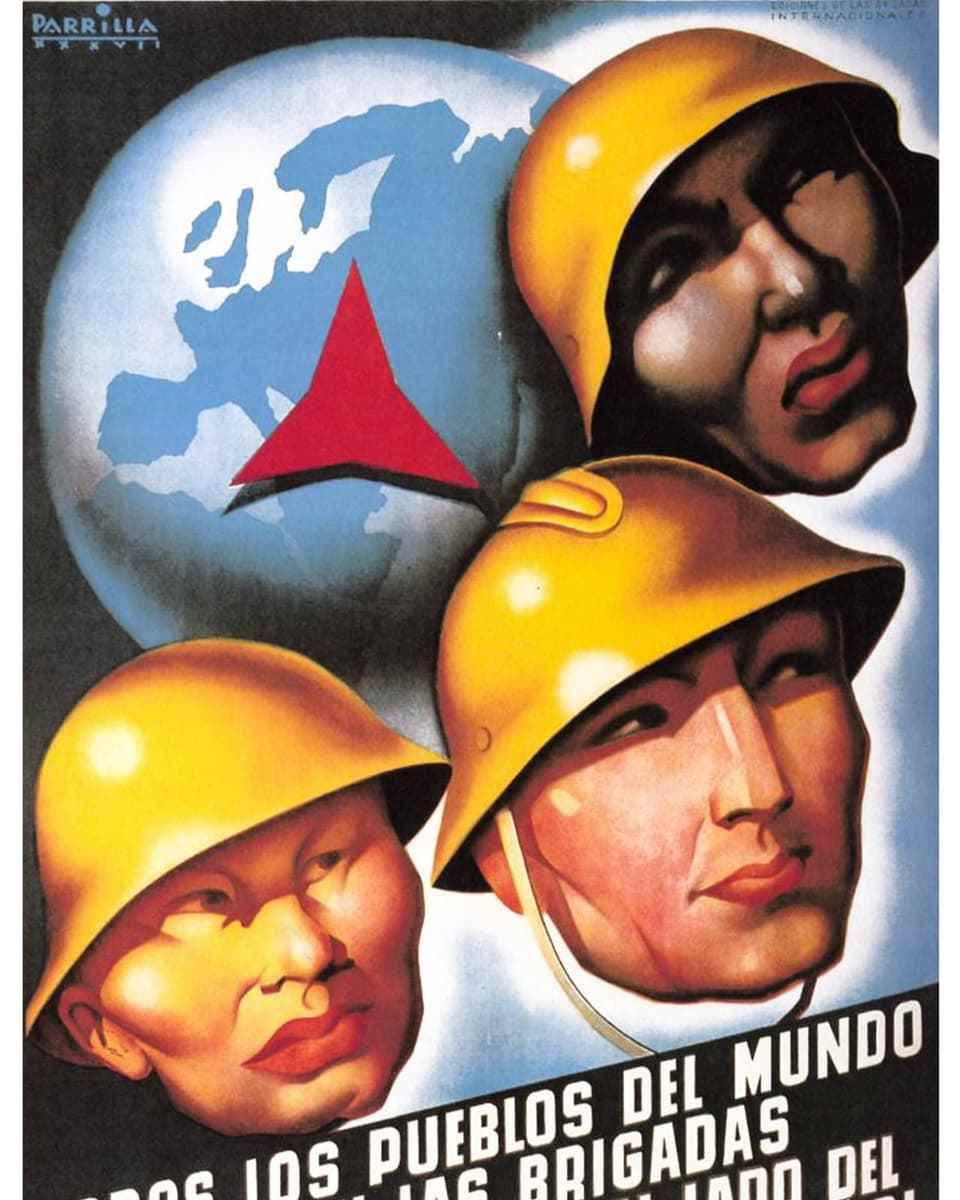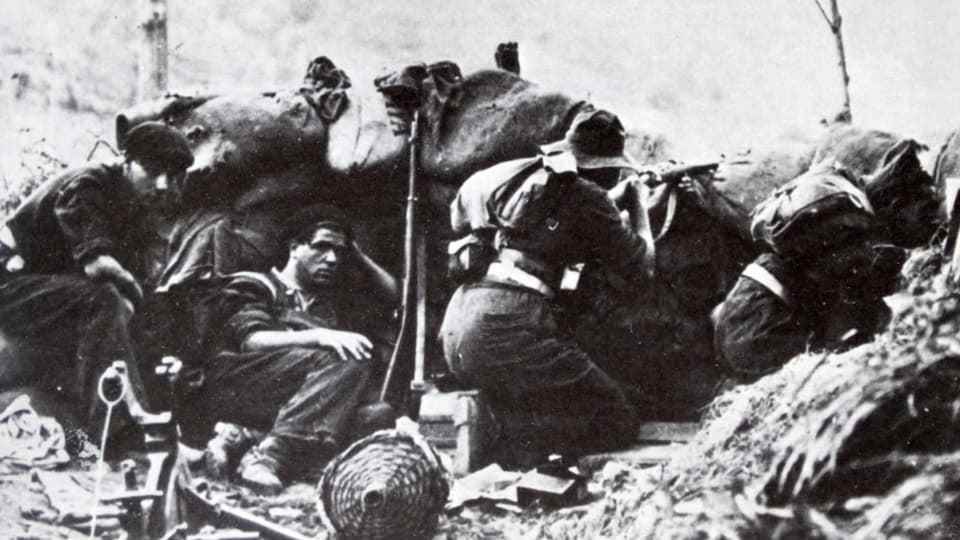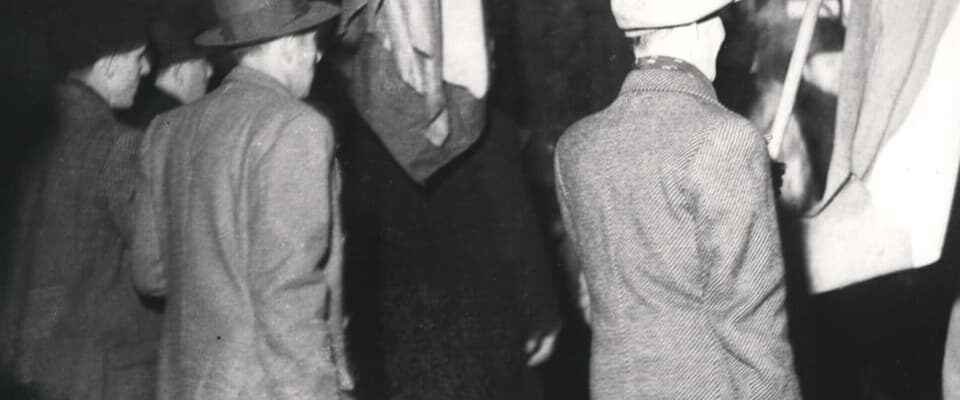«I witnessed terrible scenes. Wounded soldiers with blown off arms and men with split brains littered the battlefield. Dark plumes of smoke shrouded the battlefield. (…) It smelled of rotten meat and decay.”
This is how the young Swiss André Jobin describes the horror he experienced as a volunteer in the Spanish Civil War. Jobin is a fictional character. He is the main character in the debut novel Long Shadows over Spain by Swiss author Marc Wiederkehr, who has been living in Madrid for almost 30 years.
Legend:
Swiss returning home from the Spanish Civil War (1938), many faced months in prison in Switzerland.
Keystone/Fotostiftung Schweiz/Hans Staub
Fictional and yet real
The novel was preceded by intensive research, he says. In the character of Jobin, he condensed a large number of biographies of real Spain fighters.
Around 800 men and a few dozen women from Switzerland fought for the Republicans at the time. About 40 for Franco. Almost a quarter did not survive the hell of the war, which lasted from 1936 to 1939.
The war was waged with unrelenting harshness on both sides, by the fascists under General Franco and by the defenders of democracy, the Republican troops. At the end of the war, Franco was victorious. He led a dictatorship in Spain for almost four decades. It only ended in 1975 with the death of the generalissimo.
Volunteers against Fascism
Apart from individual passages, the picture that the fictional Spain fighter André Jobin gives in the novel is “historically consistent”, says the historian Franziska Zaugg, who researches and teaches at the Universities of Bern and Fribourg.
“If you’ve read real memoirs, André Jobin fits in quite well.” The fact that so many committed themselves as fighters can only be understood from the time: “At that time, many people were worried about the further advance of fascism, which had already firmly established itself in Italy and Germany.”
Thousands of people from all over the world volunteered to fight the fascists. A total of around 40,000 – according to estimates, significantly more than the foreign fighters currently in Ukraine.
idealists and the unemployed
Most of the “International Brigades” in Spain were socialists and communists. In addition to ideological motives, economic hardship also drove young people to Spain who were without work and earnings due to the ongoing economic crisis.
The fictional character André Jobin is also unemployed. When he arrives in Barcelona, he finds the city in turmoil: masses of people are protesting against the fascists in the streets. Jobin lets himself be carried away and volunteers to fight – to become “part of a revolution”, “maybe a big one”.

Legend:
A propaganda poster for the International Brigade (1937): «All the people of the world are in the International Brigade, side by side with the Spaniards.»
Imago / Photo12/ Ann Ronan
At the front, however, he experiences sheer horror: the battles, the deaths, atrocities against civilians. He can put up with it because he is inwardly deadened: “My inner anger hardened me. (…) I was never squeamish about raiding enemy positions, and we didn’t take any prisoners.”
Jobin describes the growing desperation in the Republican camp because the democratic states have declared themselves neutral and are not supplying weapons. Franco’s troops, meanwhile, are generously supported by Hitler and Mussolini, and in the end decisively supported the war.
The Civil War in the Civil War
All that remains for the Republicans is the – more modest – arms aid from the Soviet Union. At the price that the Soviet dictator Stalin is increasingly expanding his influence in the republican camp. The camp is divided into communists and anarchists who belong to Moscow. Jobin gets caught between the fronts, is accused of treason and tortured.

Legend:
Republican soldiers in a trench during the Gipuzkoa campaign in the Spanish Civil War.
Imago / Photo12/ Ann Ronan
With luck he was released, sent to the front again, was badly wounded and recovered. Then back to the fight. A few months before the end of the war he falls into the hands of the fascists. They put him in a prison camp.
The conditions are ghastly. Many die: “The bodies were buried in a mass grave not far from the plant at dawn.”
Behind Swiss bars
After the war ended in March 1939, Jobin was released. Home! But no sooner had he crossed the Swiss border than the local authorities arrested him. A court sentenced him to three months in prison. He violated the ban on serving as a Swiss in a foreign army. He has “weakened the military power”.
“Jobin was one of the losers in the war,” says Marc Wiederkehr, “now he will be a second time.” The character in the novel shares this bitter fate with the approximately 420 real returnees who had to serve several months in prison in Switzerland.
Little creditable pioneering role
“No country has pursued its returning fighters from Spain as severely as Switzerland,” says historian Franziska Zaugg. This fits in with the then Spain policy of the Federal Council with its Foreign Minister Giuseppe Motta: “Motta was one-sidedly Franco-friendly and was on good terms with Mussolini, Hitler and Franco”.
It is therefore not surprising that Switzerland – as the first democracy ever – had officially recognized the Francoist regime as early as February 1939, even before the end of the civil war.
After the Second World War, Switzerland immediately established economic relations with Franco-Spain and supported it in becoming part of the European economy. “Switzerland played a pioneering role there,” says Zaugg.
For the Spanish fighters affected, the humiliation of the prison sentence often cast a long shadow: “Many were socially stigmatized, no longer had the same career opportunities as before and often lived into old age in precarious circumstances and on the fringes of society.”
The Long Road to Justice
Voices calling for the Spanish fighters to be rehabilitated went unheeded in the hardened climate of the Cold War at the time.
Parliament approved it only after six unsuccessful attempts In 2009, a template that rehabilitated the Spain fighters and thus also overturned the criminal convictions against them. However, only five former fighters from Spain were still alive at the time.
Switzerland had taken its time to name past injustices. Once more.
Radio SRF 2 Kultur, context, September 9th, 2022, 9:03 a.m.
